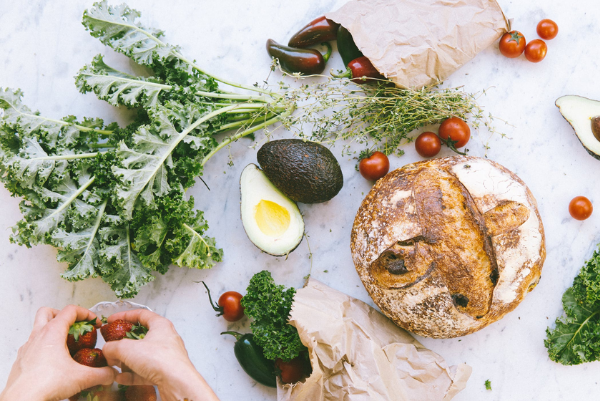Your gut is the channel via which food is broken down, digested and absorbed to give you the energy and nutrients needed to sustain life. It’s also home to trillions of microbes (known collectively as the microbiome) which carry out many jobs including forming part of your immune system, and helping regulate mood and appetite.
So how can you care for your gut and its inner ecosystem, so it can, in turn, help keep you healthy? Food choices play a big role, because they can influence the type of microbes that thrive and survive in the gut, which in turn can affect your gut and health overall. So here’s three things to include when you’re deciding what to eat.
It’s all about the fibre
When it comes to feeding your gut microbes, fibre is arguably the most important nutrient you can consume. Fibre is the name for carbohydrates which are not broken down or absorbed by humans, which means that they move through the gut and land in the large intestine. Fibre is found in plant foods like fruits, vegetables, wholegrains (like wholemeal bread), nuts, seeds and pulses.
Fibre is great nutrition for your gut bacteria. Once it arrives in the large intestine, it is consumed by gut bacteria (a process known as fermentation) who produce compounds known as short chain fatty acids (or SCFA’s for short) as a byproduct.
Scientists studying SCFA's have found they have a number of positive effects in the body - they nourish the cells lining your large intestine and strengthen the gut wall. Others support appetite regulation.
The benefits of fibre don’t stop there. Some types of fibre help add bulk to our poo, helping with regular bowel movements. Other types of fibre absorb water, helping soften our poo, making it easier to pass. So all in all, it’s a really important nutrient for gut health.
Fibre rich foods include oats, nuts, seeds, fresh or frozen fruit, vegetables, baked potatoes with skin on, lentils, chickpeas, beans, wholemeal bread and wholewheat spaghetti. When shopping, check the labels - a food is considered high fibre if it contains 6g of fibre or more per 100 grams.
Top tip: when increasing your fibre intake, it’s best to do so slowly, to give your gut time to adjust (as there can be some bloating and gas as your gut bacteria get used to the extra food). Make one food swap at a time, and allow a few days before adding the next high fibre food. Stay well hydrated too, as fibre needs water to do its job.
Fibre and IBS If you have IBS or an existing gut condition like Crohn’s, eating lots of fibre (especially insoluble fibre from wholegrain cereals, and breads, seeds and skins) isn’t always helpful, as it can make symptoms like wind, bloating and diarrhoea worse. If you’re unsure about how to adjust your fibre intake to support symptom control, a dietitian can help.
Mix things up
As a dietitian, I always encourage eating a varied diet, as this helps to ensure you get all the different nutrients your body needs to stay healthy, but research suggests variety is important for your gut microbes too.
Research from The American Gut Project found that people eating around 30 different types of plant foods a week had a more diverse microbiome than those eating 10 or fewer. Diversity in the gut microbiome is thought to be an indicator of a healthy microbiome, because with lots of different microbes, the microbiome is capable of many different jobs, and is more resilient.
So, rather than eating the same fruits and vegetables, try to choose different ones each week - a regular veg box is great for this. Make a point of switching up your grains (always have pasta with meals? Try buckwheat noodles, wild rice, sweet potato, or a different breakfast cereal), add spices and herbs to meals, and opt for mixed nuts and seeds rather than one single type.
Add some fermented foods
Fermented foods are foods made through desired microbial growth, like sauerkraut, yoghurt miso, sourdough bread and kimchi. They have been part of traditional diets for thousands of years, but as our eating habits have evolved with industrialisation, they’ve disappeared from plates in many parts of the world. But as we’re learning, these foods may have a positive effect on gut health.
In a recent study from Stanford University, a small group of healthy adults were asked to increase their intake of either consumption of fibre-rich plant foods or fermented foods (including yoghurt, kefir, fermented vegetables, and kombucha), over a period of 10 weeks. In the group that had increased their fermented food intake, researchers saw a positive change in gut microbiome diversity. More research is needed but it’s a great starting point for looking at the ways fermented food may impact health.
It’s important to note that not all fermented foods contain live cultures as some are pasteurised, baked or filtered before eating (a good example is sourdough bread), and even in those that do, they don’t meet the criteria to be termed probiotic. That’s because microbes are not deemed ‘probiotic’ unless they have specific, proven health benefits.
That said, the microbes in fermented foods may have health benefits relating to the gut. Fermented foods are often a source of other nutrients too - sauerkraut (a fermented cabbage dish) is rich in fibre, which as you know now, is great for your gut and its microbes.
Putting it togetherWhen thinking about food choices for gut health, a fibre rich diet, with plenty of variety and some fermented foods will go a long way to providing your gut with the nutrients it needs to thrive. So, the next time you’re about to sit down to eat, think; what’s here for my microbes?
ReferencesValdes AM, Walter J, Segal E, Spector TD. Role of the gut microbiota in nutrition and health. BMJ. 2018;361:36-44. doi:10.1136/bmj.k2179
Mcdonald D, Hyde E, Debelius JW, et al. American Gut : an Open Platform for Citizen Science. Am Soc Microbiol. 2018;3(3):1-28.
Medicine SNC. Fermented-food diet increases microbiome diversity, decreases inflammatory proteins, study finds. Published 2022. https://med.stanford.edu/news/all-news/2021/07/fermented-food-diet-increases-microbiome-diversity-lowers-inflammation








